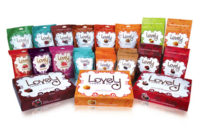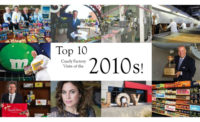Gustavo Adolfo Llano Dominguez and his brother Ignacio were only in high school when their father died.
So, the two decided to start selling sweetened peanuts, or peanuts basically covered in a sugar concoction, to other kids at their school to help the family make ends meet.
The two sold the peanuts throughout college — Gustavo went to law school, while Ignacio studied engineering. But after graduation, Gustavo was ready to give up the peanut business, anxious to get into the corporate world and wear a suit and tie every day.
And that he did. But Gustavo only lasted one month at the international company that hired him before his brother convinced him to quit and put all his efforts behind the peanut company.
The day after he quit, he bought a motorcycle. The act wasn’t one of liberation; rather he needed transportation to go out and deliver peanuts.
“I was a very important lawyer and it was hard to quit,” he explains, speaking through a translator.
In the beginning, they sold mostly to friends of the family as well as schools and discotheques.
|
Manitoba |
|
Headquarters: Cali, Colombia Sales: $22 million Products: Sweetened peanuts, peanuts with sesame, chocolate peanuts, Japanese peanuts, three different types of trail mix, mixed nuts with macadamia nuts, almonds with sea salt, macadamia nuts with sea salt, pistachio, cashews with sea salt, corn and peanut butter. Number of employees: 220 Management team: Brothers Ignacio Llano Dominguez, general manager, and Gustavo Adolfo Llano Dominguez, export manager. Website: www.manitoba.com.co |
But it’s been about three decades since then, and now Gustavo can again say he works for an international company. What started as a way to make some side money has turned into Manitoba, a Colombian company that sells much more than just sugared peanuts and exports to Ecuador, Perú, Venezuela, Guatemala, Bolivia, Costa Rica, Panama, the Caribbean and Canada.
Today, Manitoba’s product lines include sesame seeds with sugar, chocolate-covered peanuts, honey peanuts, Japanese peanuts, three different trail mixes, mixed nuts, macadamias, almonds with sea salt, macadamias with sea salt, pistachios, cashews with sea salt, and even peanut butter.
The variety seems to be working. Last year, the company posted $22 million in sales, and they project revenues will top $26 million in 2012.
Of course, in the beginning it was just about the peanuts. One of their first challenges was coming up with a name. They originally wanted to use their family name, but at the time it just wasn’t safe to associate your last name with your company in Colombia.
So, instead, they named it Manitoba after a city in Canada. A friend gave them the idea because “Mani” translates to peanuts, and that was enough of a reason as any to go with it.
As for the logo, it features “Manitoba” written in blue letters on an orange peanut-shaped design and two peanut men meant to represent the two brothers. They joke that Gustavo is the one on the left because he’s bald. When they first designed the logo 20 years ago, neither of the peanut men were wearing clothes, but as the times changed so did the logo; now they both have pants on.
It was 1987 when they first bought a little warehouse in Cali, Colombia, a city known as the salsa dancing capital of the world.
They outgrew that in 1991 though, and upgraded to their current location, still inside the Cali city limits. The building houses offices and manufacturing. A second facility outside the city limits handles most of the incoming raw materials and also serves as a distribution center. Major raw ingredient shipments are easier to deal with outside of the city limits. Moreover, town officials are considering a ban on larger trucks into the city as a means of curbing congestion.
Like most entrepreneurs, the two brothers eventually want to locate all operations under one roof, say a 5,000-sq.-meter warehouse.
As for the equipment, many of the machines in the factory are actually designed by Ignacio, who has an engineering background. He works with a company in Cali to design the finished machine, which then meets their needs exactly.
Manitboa’s main product, Sweetened Peanuts, or in Spanish, Mani Confitado, are made in the Cali facility. The majority of the peanuts come from Colombia, but about 40% are from Argentina. No matter where they’re from though, Manitoba buys them without shells, and then cooks them in hot oil for four to seven minutes. That serves to make the peanuts crunchy. Moreover, because peanuts have their own natural oil, they don’t absorb the oil they’re fried in. In fact, the used oil is sold to the cattle industry.
Once the peanuts are drained after frying, they are transported to cooling tables. Employees inspect the peanuts before they’re released for further processing. The peanuts are then conveyed up to the second floor where they are coated with sugar and/or other ingredients.
For example, the company’s Japanese peanuts are coated with honey and powder.
As an exporter, Manitoba can purchase Colombian sugar at discounted rates. Macadamia nuts as well as most of the cashews are also sourced domestically.
After the nuts are coated and dried, they’re sent back downstairs to be packaged with a Teepack doy pack, which was the first doy pack machine in Colombia.
The Cali factory operates at about 50% production capacity. Two shifts keep the facility running 20 hours a day, but continued growth will likely necessitate moving operations into a larger facility.
Currently, domestic sales account for 80% of all revenues, exports the remainder. The brothers, however, look to grow exports to 30% of sales.
One of their strategies involves selling more peanuts into the United States, but there are some challenges for the brothers with that plan.
Despite a recent Free Trade Agreement between Colombia and America, imported raw peanuts still have an extremely high import tax of 120%. So, even though Manitoba’s main product is technically a processed peanut because of the sugar coating, custom officials have held up imports in the past. Consequently, the two siblings are worried it will happen again.
They are working to clarify the situation, because if the U.S. Customs says the product is officially a value-added good, they should be able to export into the United States tax free under the new FTA.
In the meantime, they are shipping small amounts of their products to New York, with the idea that if something gets held up, it wouldn’t be too big of a financial setback.
“The United States of America and the Caribbean Islands are a very interesting market for us,” Gustavo says. “Several U.S. importers are interested, but the problem is customs.”
Even so, the brothers may have never even tried exporting to the United States if it wasn’t for Colombia’s effort to encourage business owners to explore international markets. Specifically, Proexport, a government agency that works with exporters, helped Gustavo take his first trip to the United States in 1996 to attend the Fancy Food Show.
They guided him through the entire process, and he got a feel for what the business culture was really like in America.
“Proexport said, ‘Go to the United States, you need to open your mind,’” Gustavo recalls. “It was a very, very good experience.”
The United States isn’t the only international market Manitoba is going after though, and they’re always on the lookout for an edge, which is why they’re making sure they have all their certifications, such as HASB, an European certification for good manufacturing practices.
Gustavo knows his home country — which battled drug violence for years — isn’t always seen through the best light abroad, which makes exporting more difficult. But like nearly everyone else in Colombia right now, he maintains that things have drastically improved over the last decade.
“Colombia is increasing in the quality of the peanuts, human capital, security, infrastructure,” Gustavo says. “It’s a different country than it was 10 years ago. We feel more positive. Ten years ago, Colombia was the ugly girlfriend, now we’re the beautiful bride.”
















